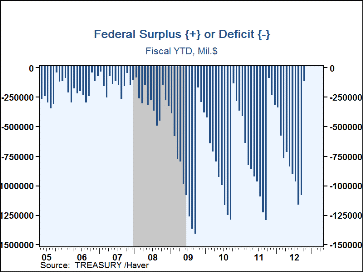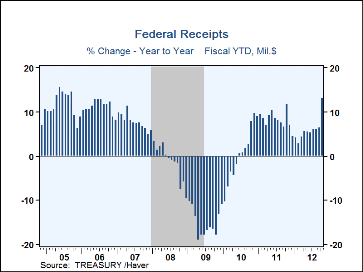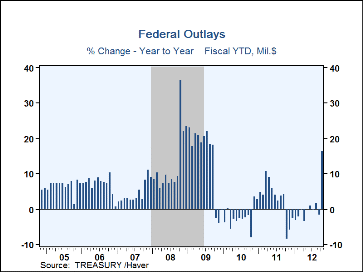 Global| Nov 13 2012
Global| Nov 13 2012U.S. Budget Deficit Deepens
by:Tom Moeller
|in:Economy in Brief
Summary
The Federal Government budget deficit deepened to $120.0B during October of FY13 versus $98.5B last fiscal year. The deeper deficit was paced by a 16.4% y/y increase in outlays which was greater than the 13.0% y/y rise in revenues. [...]
 The Federal Government budget deficit deepened to $120.0B during
October of FY13 versus $98.5B last fiscal year. The deeper deficit was
paced by a 16.4% y/y increase in outlays which was greater than the 13.0%
y/y rise in revenues. Expectations were for a deficit of $115B.
The Federal Government budget deficit deepened to $120.0B during
October of FY13 versus $98.5B last fiscal year. The deeper deficit was
paced by a 16.4% y/y increase in outlays which was greater than the 13.0%
y/y rise in revenues. Expectations were for a deficit of $115B.
The 16.4% increase in outlays was due to a 79.9% y/y rise in Medicare payments accompanied by a 23.6% y/y gain in income security outlays. Also strong was the 13.5% y/y rise in health outlays, although these spending increases were biased higher by a shift in payments' timing last year.
Net revenues rose a strong 13.0% powered by a 17.6% gain in individual income taxes, but held back by a one-third drop in corporate tax payments. Social insurance payments rose a steady 2.7%. Revenues also were biased higher by the timing of last fiscal year.
Haver's basic data on Federal Government outlays and receipts, and summary presentations of the Budget from both OMB and CBO are contained in USECON. Considerable detail is given in the separate GOVFIN database.
| US Government Finance | Oct | FY'12 | FY'11 | FY'10 | FY'09 | |
|---|---|---|---|---|---|---|
| Budget Balance | -- | $-120.0B | $-1,089B | $-1,298.7B | $-1,294.2B | $-1,415.7B |
| As a percent of GDP | -- | -- | 7.0 | 8.6 | 8.0 | 9.5 |
| % of Total | ||||||
| Net Revenues (Y/Y % Change) | 100 | 13.0% | 6.4% | 6.5% | 2.7% | -16.6% |
| Individual Income Taxes | 47 | 17.6 | 3.7 | 21.5 | -1.8 | -20.1 |
| Corporate Income Taxes | 8 | -34.3 | 33.8 | -5.4 | 38.5 | -54.6 |
| Social Insurance Taxes | 36 | 2.7 | 3.2 | -5.3 | -2.9 | -1.0 |
| Excise Taxes | 3 | 36.8 | 9.2 | 8.2 | 7.1 | -7.2 |
| Net Outlays (Y/Y % Change) | 100 | 16.4 | -1.7 | 4.1 | -1.8 | 18.2 |
| Nat'l Defense | 20 | 7.5 | -3.6 | 1.7 | 4.6 | 7.6 |
| Health | 10 | 13.5 | -7.0 | 1.0 | 10.4 | 19.1 |
| Medicare | 20 | 79.9 | -2.8 | 7.5 | 5.0 | 10.1 |
| Income Security | 17 | 23.6 | -9.2 | -4.1 | 16.7 | 24.9 |
| Social Security | 20 | 6.2 | 5.8 | 3.4 | 3.5 | 10.7 |
| Veterans Benefits | 4 | 89.1 | -2.0 | 17.3 | 13.6 | 12.7 |
| Interest | 6 | -0.2 | -2.1 | 15.8 | 2.9 | -24.6 |
Tom Moeller
AuthorMore in Author Profile »Prior to joining Haver Analytics in 2000, Mr. Moeller worked as the Economist at Chancellor Capital Management from 1985 to 1999. There, he developed comprehensive economic forecasts and interpreted economic data for equity and fixed income portfolio managers. Also at Chancellor, Mr. Moeller worked as an equity analyst and was responsible for researching and rating companies in the economically sensitive automobile and housing industries for investment in Chancellor’s equity portfolio. Prior to joining Chancellor, Mr. Moeller was an Economist at Citibank from 1979 to 1984. He also analyzed pricing behavior in the metals industry for the Council on Wage and Price Stability in Washington, D.C. In 1999, Mr. Moeller received the award for most accurate forecast from the Forecasters' Club of New York. From 1990 to 1992 he was President of the New York Association for Business Economists. Mr. Moeller earned an M.B.A. in Finance from Fordham University, where he graduated in 1987. He holds a Bachelor of Arts in Economics from George Washington University.
More Economy in Brief
 Global| Feb 05 2026
Global| Feb 05 2026Charts of the Week: Balanced Policy, Resilient Data and AI Narratives
by:Andrew Cates








